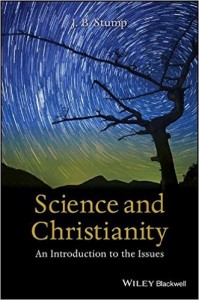 In a popular story line the Scientific Revolution and the secularization of society moved hand in hand. A scientific society will, of course, be secular. Scientific thought eliminates the divine from the realm of rational thought. J.B. Stump in Science and Christianity explores secularization and the role of science in the process in chapter three of his new book Science and Christianity: An Introduction to the Issues.
In a popular story line the Scientific Revolution and the secularization of society moved hand in hand. A scientific society will, of course, be secular. Scientific thought eliminates the divine from the realm of rational thought. J.B. Stump in Science and Christianity explores secularization and the role of science in the process in chapter three of his new book Science and Christianity: An Introduction to the Issues.
There is no denying that the Scientific Revolution and the secularization of Western culture has occurred in parallel. The question is one of cause and effect – did the rise of scientific thinking cause the secularization of society? Christianity may well have served as a fertile ground for the development of science as discussed in the previous post on this book (The Christian Origin of Science?), but perhaps it was only a stepping stone to a more advanced mode of thought. Stump brings Auguste Comte and his Law of Human Progress into the discussion, “human thinking necessarily passes through three stages: the theological, the philosophical (or metaphysical), and the scientific.” (p. 29) Quoting Comte: “The first is the necessary point of departure of human understanding; and the third is its fixed and definite state. The second is merely a state of transition.” (p. 30)
The atheist scientist. There is no doubt that religious belief is lower among elite scientists than among the general US population. Several recent surveys have demonstrated this, although the differential is much smaller when a broader range of scientists are surveyed. The secularization thesis would suggest that this is because scientific thinking drives out religion. The truth is undoubtedly far more complex. Stump points out that the overall numbers have not changed much over 100 years – from a survey given in 1914 to recent surveys in the late twentieth and early twenty first centuries. I would suggest that the relatively lower level of religious faith among elite scientists may have as much to do with the psychology of ego and power as with the influence of scientific thinking itself.
 Natural replaces supernatural. Perhaps secularization isn’t so much the loss of faith among scientific thinkers as it is characterized by the replacement of supernatural explanations with natural explanations. If a person or the broader culture take the view that scientific and supernatural explanations are mutually exclusive, then science and faith will necessarily be in competition with only one ultimate winner. The scientific revolution secularizes society by inextricably moving phenomena from one side of the arena to the other.
Natural replaces supernatural. Perhaps secularization isn’t so much the loss of faith among scientific thinkers as it is characterized by the replacement of supernatural explanations with natural explanations. If a person or the broader culture take the view that scientific and supernatural explanations are mutually exclusive, then science and faith will necessarily be in competition with only one ultimate winner. The scientific revolution secularizes society by inextricably moving phenomena from one side of the arena to the other.
The Intelligent Design movement arose in response to this tension in the US. There must be some phenomena that are irreducibly and demonstrably divine rather than natural. In this way faith can be saved and defended. An alternative approach is to see even the natural explanations as the works of God. This isn’t a new idea, adopted because we are losing the battle (i.e. science continues to expand). “Samuel Clarke, the public mouthpiece for Isaac Newton, believed that natural laws are descriptions of the way that God normally chooses to work through the natural order.” (p. 36)
A secular age. Charles Taylor (A Secular Age) we are in a secular age where faith is one possible option among others. “The real story, then, is the rise of the background Taylor calls exclusive humanism which makes possible a range of religious beliefs or none at all. According to exclusive humanism, there is no transcendent order and no ultimate goals beyond that of human flourishing.”(p. 37) The rise of deism is either a causal factor (as Jim suggests from Taylor) or a symptom of this secularization. A deist God is impersonal with no relevance for day-to-day life. Some will argue that deism, arising from a rejection of the miraculous, has its origin in the scientific revolution. Taylor suggests that the rejection of the miraculous originated not in scientific thinking, but from the lack of miracles in common experience. In David Hume, for example, “the primary argument was that miraculous events contradict our experience, and as such it is more reasonable for us to believe that the testimonies to the miraculous were mistaken. Furthermore, all the religious traditions had their own miracle stories, which were disbelieved by others, and this leads to a mutual cancelling-out of all testimonies.” (p. 38)
I am not convinced. That this argument from experience rules out an origin in the scientific revolution may be a gloss over the complexity of human thought. Arguing from experience, and dismissing the miraculous on that ground, strikes me as piercing to the very root of scientific thinking. Although there are counter-intuitive conclusions at times (modern physics is such an example), scientific thinking is developing a logical argument from experience and observation.
Jim goes on to suggest (following Michael Buckley in At the Origins of Modern Atheism) that deism may have risen to prominence in large part because of the arguments used by theologians to counter atheism. It was treated as a philosophical problem. “The bare theism with which they were left was unable to support the wider context of the life of faith.” (p. 38) He summarizes the main point: “Taylor and Buckley think the secularization of society was ultimately the result of Christian thinkers abandoning specifically Christian theology and opting for a more generic philosophical theism.” (p. 40)
Clearly it is not as simple as often expressed, that the scientific revolution did away with God. It is, Jim argues, “difficult to maintain a straightforward causal relationship between the advance of science and secularization.”(p. 39) The relationship may be better described as hand-in-hand rather than cause and effect. To begin with, it might be useful to ask why Christian thinkers opted for a more generic philosophical theism. Perhaps this choice was a result of the broader cultural milieu that valued logical arguments over other forms of reasoning. The same cultural milieu that gave rise to the scientific revolution.
Do we live in a secular society?
What role (if any) does science play in secularization?
If you wish to contact me directly you may do so at rjs4mail[at]att.net
If interested you can subscribe to a full text feed of my posts at Musings on Science and Theology.





